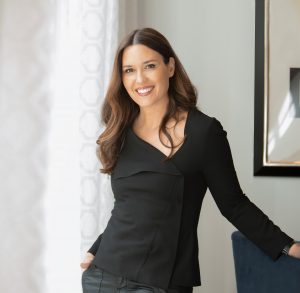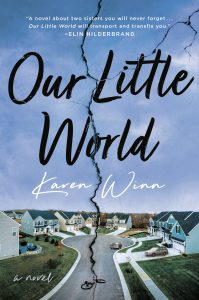A Rose and a Thorn
 Many years ago, we welcomed into our family a niece, a beautiful girl who was given a beautiful name. It was, as are many births, a joyous occasion, and all were happy and merry.
Many years ago, we welcomed into our family a niece, a beautiful girl who was given a beautiful name. It was, as are many births, a joyous occasion, and all were happy and merry.
Almost all. I was panicking slightly, because the newborn’s name was similar to one I’d already chosen for a central character in my debut novel, Our Little World. Never mind that the novel hadn’t yet been coherently written, that it existed mostly inside my head and on scraps of paper. I needed to know right then if I was going to have to change the name.
So, I wished the new mom congratulations, and then I proceeded to probe her thoughts on the matter. (Because this was clearly Very Important).
The mom was Very Nice, especially given the timing. “It’s a different name,” she said. (This was true. But still—it was similar).
“No, you don’t need to change it,” she replied, when I offered. (Hmm. As writing was merely a hobby of mine at that point, imposter syndrome caused me to wonder whether she thought it actually mattered?).
“Really. Don’t change it,” she assured me, when I pressed her.
So, I didn’t. And I heaved a sigh of relief, because doing so very well may have altered my character’s burgeoning personality or storyline, even.
For me, story lies in character evolution, the kernel of which begins with the naming of my characters. I need to meet them to discover who they are, what they want. What they’ll lose. I embark on every creative project with specific names in mind; introducing oneself, after all, is the primary step of a first-time encounter. In fact, while Our Little World underwent countless revisions, one of the few constants was the firm selection of my characters’ names—and, by default, their associated personalities. (No disrespect to Shakespeare, but the roses in my novels need to be named accordingly).
My main protagonist, Borka, is an awkward twelve-year-old who considers herself inferior to her sister, Audrina. The setting is 1985, small-town America, and Borka feels acutely aware of the strangeness—and perceived ugliness—of her name, passed down from a distant Hungarian aunt who’d died tragically young. Borka therefore decides early on in life to go by “Bee”—a marked improvement—but, of course, a nickname is simply that, and she can’t ever quite shake her birth name, nor what she views as its unattractive implications.
In contrast, Bee’s sister Audrina has a beautiful name, one that fits her perfectly. It was chosen, Bee believes, as one ought to rightfully acquire a name: because it’s pretty.
So, from the start, the two sisters are already positioned at odds with each other: Audrina and Borka, Beauty and the Beast. A rose and a thorn.
I am quite certain that these two characters would not have experienced the full range of their complex relationship—the intimacy and the tension—had they not been named accordingly. During my early research, I went through list after list of Hungarian girl names until I came across “Borka,” meaning foreigner, or stranger.
Yes, I remember immediately thinking. Yes; this is she. It was a name both unfamiliar to the American ear and apt for a character who feels like an outsider. It was perfect. Similarly, once I began to envision the sister who would become Audrina, and pictured her beauty and vulnerability (more vulnerable than even I initially knew), the name materialized—and rooted—in my head. It likely came to me from V.C. Andrew’s My Sweet Audrina, or perhaps even the reality star Audrina Partridge (exact origins of inspiration can be notoriously difficult to pin down). But once I’d conceived it—and all that went along with such a lovely name—I knew she needed to be born into my novel.
Admittedly, there are occasions where I am less certain about the name than I am about its first letter. Hope Rodale, for instance: the queen of the seventh-grade mean girls in my novel. When pondering possible monikers, all I could think of was the 1989 teen black comedy, Heathers. I realized I wanted—no, needed—to use an “H” name. Had Hope Rodale been a Mary, she would not have been nearly as terrible (which is to say, terrific). I also decided to use a first and last name for her, because she is just one of these people whom people refer to by their full name (you know the type).
Then there’s Max, the cute boy who moves in across the street from Bee and Audrina, and his four-year-old sister Sally, who goes missing one summer day at the lake, setting everything in motion. I’d always liked boy names that begin with M—it’s been my personal experience that such boys (including an old high school boyfriend) have a certain allure—and, as for Sally, I wanted an old-fashioned, innocent sounding name. I felt that using such a name would heighten the magnitude of her tragic disappearance in the small town.
The characters in Our Little World, a lyrical coming of age story that follows Bee and Audrina’s fraught relationship in the aftermath of Sally’s disappearance, were formed with intention and care. After becoming acquainted with them in my head, starting with their names, I moved them into the world of the book where they belonged. They shifted from one page to the next, through various revisions, sometimes even briefly disappearing with deleted material, before reappearing in newly written scenes.
When they finally found their proper footing—when I had a book deal in hand (their names soon to be permanently inked in fictional history)—I returned to the family member to remind her of that fateful conversation all those years earlier.
“I don’t remember ever talking about this,” she said. (Uh oh, I thought.).
“But it’s totally fine. It’s a different name than my daughter’s,” she assured me, once again. (Phew).
She was right, though. My character’s name is different, and my character is different. Since our original conversation, the girl in my novel had grown into and assumed a life—and little world—of her own.
###
ABOUT KAREN WINN
OUR LITTLE WORLD is her first novel.
Visit her website:
Instagram: @kbookwriter
Twitter: @kbookwriter
Facebook: @kbookwriter
Our Little World
 “I was intrigued by Our Little World from the chilling first paragraph. It’s a coming-of-age novel complicated by a tragic and untimely death, and it’s also a novel about two sisters you will never forget. I fell in love with the confidence of the writing and the colorful nostalgia of the mid-’80s details. Our Little World will transport and transfix you.”—Elin Hilderbrand
“I was intrigued by Our Little World from the chilling first paragraph. It’s a coming-of-age novel complicated by a tragic and untimely death, and it’s also a novel about two sisters you will never forget. I fell in love with the confidence of the writing and the colorful nostalgia of the mid-’80s details. Our Little World will transport and transfix you.”—Elin Hilderbrand
July 1985. It’s a normal, sweltering New Jersey summer for soon-to-be seventh grader Bee Kocsis. Her thoughts center only on sunny days spent at Deer Chase Lake, on evenings chasing fireflies around her cul-de-sac with the neighborhood kids, and on Max, the boy who just moved in across the street. There’s also the burgeoning worry that she’ll never be as special as her younger sister, Audrina, who seems to effortlessly dazzle wherever she goes.
But when Max’s little sister, Sally, goes missing at the lake, Bee’s long-held illusion of stability is shattered in an instant. As the families in her close-knit community turn inward, suspicious and protective, things in Bee’s own home become increasingly strained, most of all with Audrina, when a shameful secret surfaces. With everything changed, Bee and Audrina’s already-fraught sisterhood is pushed to the limit as they grow up—and apart—in the wake of an innocence lost too soon.
Perfect for readers of Celeste Ng’s Everything I Never Told You, Our Little World is a powerful and lyrical coming-of-age story that examines the complicated bond of sisterhood, the corrosive power of envy, and how the traumas of our youths can shape our identities for a lifetime.
Buy HERE
Category: How To and Tips






























